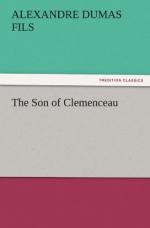Since Cesarine had returned, the conflict of duty and passion would be resumed and he felt sure that he had been defeated before. Reflecting profoundly, he could come to no other conclusion than that he ought to shun the dangerous traitress.
As he lifted his head, less troubled after arriving at this resolution, he was not sorry to see that Clemenceau had silently entered the room.
“Oh, is it you, my dear master?” he exclaimed.
It was not easy on that placid brow to read whether he knew of Cesarine’s return or not.
“Well, are you satisfied with your test this morning?” inquired he. “Have you succeeded with the bullets of the new shape?”
“I believe so,” answered Antonino, “for the modifications which you suggested, improved it in every point they dealt with. They go forth clean and the windage is much reduced.”
“Is the range improved?”
“At fourteen hundred metres I put two elongated balls into an oak so deeply that I could not dig them out with my knife. They struck very closely to one another. It is a hundred metres greater distance. Inserting the bullets by the mass of twenty-five and firing the two took four seconds. I was less careful about marking where the others struck, and one that I discharged on my return near the house broke and went badly askew. With bullets made by regular moulders, such an accident should not happen.”
“Have you any left? Let me see.”
Antonino took two bullets from his waistcoat pocket; they were unlike the ordinary globules, and resembled the long, pointed cylinders of modern guns. With a pair of pocket plyers, he broke one to exhibit the interior to Clemenceau; it was composed of two metals in curiously shaped segments and a chamber in one end contained a loose ball of another and heavier metal, on the principle of the quick-silver enhancing the force of the blow of the “loaded” executioner’s sword. All had a novel aspect, but the chief inventor was familiar with the arrangement.
“By the cavity in it I have reduced the weight of three to two,” went on Antonino. “I am in hopes to put in fifty or sixty bullets at a time without making the arm too heavy, and that would suffice, considering that the replacement of the mass of projectiles requires no appreciable time, while the supply of explosive, liquefied air suffices for three hundred discharges. The repetition of the emissive force does not jar the gun, and the metal of our alloy does not show a strain although the gauge induces a pressure of fifty thousand pounds per square inch if it were accumulated.”
“And the injection valve?”
“It works as easily by pressure on the disc, which replaces the trigger, perfectly.”
“That was your idea.”
“After you put me on the track,” returned the Italian, gratefully. “Oh, I am still very ignorant in these matters.”
“Not more than I, a few months ago. I had not handled a firearm until—” he checked himself and frowned; then, tranquilly resuming, he said: “Labor, and you will reach the goal!”




